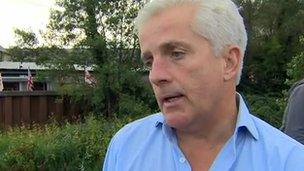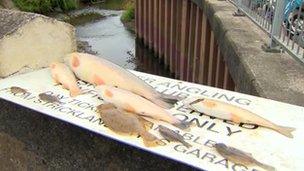River Enler fish kill: 5,000 dead trout found
- Published

Martin Hamilton apologised on behalf of his firm, Martin Hamilton Farms
Almost 5,000 dead brown and sea trout have been found after a fish kill on the river Enler in County Down.
A marine biologist has said it could take years or even decades before the river recovers after a pollutant entered the water.
Dirty water entered the river, near Comber, and removed the oxygen in the river.
Ian Kittle said it had "absolutely devastated" the entire ecology of the river.
Two government departments are investigating.
Martin Hamilton, the farmer responsible for the pollution, said he was deeply sorry and explained that water used for washing crops on his land had leaked into the river.
He estimated about 25 tonnes, or 25,000 litres, of the dirty water left the farm.
Mr Kittle, who lives in Comber, said he had spoken to Mr Hamilton.
'Cast-iron guarantee'
"He assured me that it was biological oxygen demand (BOD) which was used on his farm, which in layman's terms is organic waste that takes an awful lot of oxygen out of the water as it's breaking down and that is essentially what has caused the fish kill and the potential other damage to the river," he said.
Mr Hamilton said he would "throw every resource" to ensure the river would recover and gave a "cast-iron guarantee" that he would replace any lost fish stock.

The DoE was alerted to the fish kill by an anonymous caller
Mr Kittle said many types of fish lived in the river.
"It's a brown trout and sea trout river, those are the fish that have been placed in and bred over the last 40 or 50 years, but the big problem is there's a whole range of other fishes in there," he said.
"There's flat fish, eels, sticklebacks, there's a whole range of fish in there, and while it's possible to put in more brown trout and sea trout, the other species just aren't going to be replaced, they are going to have to be naturally brought back in gradually without human intervention."
The Enler River flows into Strangford Lough.
Mr Kittle said the only "small saving grace" was that it appeared the tributaries running into the main river had not been affected.
Evidence
"Depending upon the damage that has been done, not just to the fish and invertebrate species in the river and potentially how much has been lost, it could be years, perhaps even decades, before the river returns to normal," he warned.
The Department of the Environment (DoE) described it as a water pollution incident of "high severity".
The DoE said a "definite line of inquiry" was being followed. It said evidence was being collected from premises with a view to prosecution.
A joint investigation is being carried out by the Northern Ireland Environment Agency, part of the DoE, and the Inland Waterways and Fisheries branch of the Department for Culture, Arts and Leisure.
The DoE said it had been alerted to the fish kill following an anonymous call to the water pollution hotline on Thursday.
An inspection was subsequently carried out by the Northern Ireland Environment Agency.
- Published22 August 2013